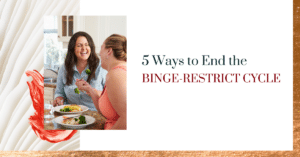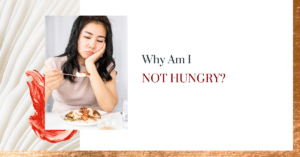How to Respond to Diet Talk

A topic that keeps coming up with my clients this month: how to respond to diet talk and conversations about dieting, weight and health. With January comes *the* height of diet culture – I often (semi) jokingly call it “National Dieting Month”. Whether you’re working on improving your relationship with food, challenging yourself to not start a new restrictive diet this year, or your resolution is say ‘bye’ to diet culture, we can all use some extra support in navigating food, weight and diet talk.
If you’d like a copy of this blog as a PDF download, you can download a copy here.

January is a tough month. We see a huge spike in ads for new gym memberships, quick-fix diet programs and reminders from every industry that we should be trying to lose weight and “fix” our bodies. This is often under the guise of being “healthy”…even when it’s still clearly marketing a diet and weight loss. Diet culture is in full swing and for many clients, our conversations over the past month have circled around how to navigate diet talk in the New Year, and all year round.
So today I wanted to break down common situations where diet culture may come into play and how you can respond to diet talk in these scenarios. You can also check out our post How to Explain Intuitive Eating to a Friend for other ideas.
A few helpful reminders:
When you find yourself in a diet/food/weight-talk situation and you’re not sure what to say, remember that:
- You’re not always going to have the ‘perfect’ thing to say.
- You don’t need to always (or ever) have your anti-diet culture advocacy hat on.
- You don’t need to always share why exactly you don’t want to talk about diets or weight or workouts.
- You don’t need to get into conversations about weight and health to be making a difference or standing up to diet culture.
- You’re allowed to take a break and not say anything.
- You’re allowed to say the “wrong” thing.
- You’re allowed to have boundaries around how much you share about your recovery, relationship with food, your body and your own experiences.
This guide is meant to serve as inspiration, give some tools and sample responses and ultimately allow you to feel more comfortable when you do find yourself in a conversation that you want to better navigate.
How to Respond to Diet Talk:
At Social Events
When you’re at a social event, often the conversation is light and you might be meeting a lot of new people or acquaintances, so diet talk is bound to be as popular as the crab cakes.
Scenario: Someone starts talking about their own diet/exercise plan…and won’t stop
- Response: “That actually makes me think of this amazing documentary I saw about this rock climber in Yosemite. I’ve been wanting to visit _________ have you ever been?”
- Response: “It has been so nice talking with you, I just saw someone come in who I’ve been meaning to say ‘hi’ to.”
- Response: “I actually made a new year’s resolution to always talk about something new at parties – don’t you feel like we always talk about diets?! Have you read any good books recently?”
- Response: Just leave – “Excuse me, I need to run to the restroom.”
Why This Works & Helps You: Diet culture is so pervasive that it’s become a way for people to bond, and you’re pointing out that there are other ways, which can feel empowering. Simply not engaging in it also saves you the brain fatigue.
In Passing
For situations when someone who you don’t know well or are having a short interaction with, like a cashier, an Uber driver, a front desk attendant, etc. This might not be a situation where you’re in a place to really prepare yourself or want to elaborate, but having a few ideas of phrases to exit or move on in the conversation can be helpful.
Scenario 1: When someone makes a comment about your body, food or dieting:
Cashier at grocery store: “Oh we’re being bad aren’t we?”
- Response: “Imagine if eating Skittles made us ‘bad’? I’m not stealing them, right?”
- Response: “Hey, there’s no problem with eating things that taste good!”
- Response: “Those comments actually make me uncomfortable. I’d appreciate if you didn’t say that to me.”
Why It Works: It points out the absurdity of the idea we are “good” or “bad” based on what we choose to eat. Again, they may not get it, but you do, and it reinforces in your own mind that you get to eat what you like.
Scenario 2: When someone makes a comment about compensating for what you have or will eat:
A friend or family member says to you, “Making up for those weekend cheat meals, huh?”
- Response: “That’s not how bodies work, there’s no need to have to make up for what I eat.”
- Response: “Please don’t comment on my body or exercise.”
- Response: *Ignore and walk away*
Why it works: It says loud and clear that your body and food consumption is not up for discussion.
In the gym
Unfortunately, it’s common for fitness classes and gyms to be a hub for body/diet/weight talk. To avoid this, you can start to find non-diet, body-positive gym spaces, and in the meantime practice some responses in case it does come up.
Scenario: You see, hear or notice negative, unwanted or shaming comments being made to you or others in the gym.
This is a great time to approach the front desk staff or gym manager. Some ideas of what to say:
- Response: “Hey, I really enjoy your workouts and space, you might want to consider talking to your instructors about the language they use during class. Some of their comments aren’t actually that helpful and are a real turn-off for me and others wanting to workout here. Here’s a good blog post explaining more.”
- Response: “I wish you guys weren’t hosting this challenge. I love your trainers and philosophy here, but this _______ challenge feels like it goes against what you normally talk about. I like moving because it feels good and I feel stronger, not because I want to feel like I need to be smaller.”
- Response: “Hey ______, I really like your class and normally feel so motivated during it. I noticed today you said something about earning our dessert tonight. That was really triggering to me and I’m sure some other people who come to and love your classes too. I just wanted to let you know. I come to your class because I normally love your message, but I don’t like to mix my exercise with earning food – it doesn’t make me feel good.”
- Response: “I’ve actually been working out because of how it makes me feel, not to try and change my body. It has been SO freeing with my relationship with food, and my mental and physical health!”
- Response: “I don’t want to talk about diets/weight.”
At a Restaurant
If you get comments about food or dieting while out to eat, here are some ideas of what to say. Remember, you always have the right to eat food you like in a satisfying amount. Diet talk and diet culture don’t get to keep you from fun and tasty meals!
Scenario 1: A waiter says something about your food order.
“Oh, calories don’t count today, do they?!”
- Response: “Actually, I don’t count calories and I order what I want. I’ll have ____________.”
“We’re being bad today, aren’t we?!”
- Response: “Bad? For ordering food? Why would that be bad?”
- Response: “The only thing bad would be if I get hangry from trying to not order what I want.”
Scenario 2: Having a meal with friends.
“Oh come on, this was expensive! Have the rest of it.”
- Response: “I’m satisfied, thank you though! Maybe we can take it to go?”
“Did I tell you about my co-worker’s new diet? She does……”
- Response: “I’d rather talk about something other than diets, what’s the best meal you’ve ever had?”
- Response: “I really like talking to you but I prefer to talk about topics other than weight and dieting. Have you seen *X new movie*?”
Scenario 3: You’re on a date and they make comments about what/how much you’re eating.
“Do you want the rest of this?” (If you’re not hungry for more)
- Response: “It was so delicious! I’m full though, thank you. You can have that piece!”
- Response: “I’m pretty satisfied, but why don’t we take it to go?”
“That’s all you’re eating?”
- Response: “It’s so good, but I’m starting to feel full. Do you want some of it?”
- Response: “Don’t worry, I’ll tell you if I’m still hungry. But right now this is good for me!”
“Do you want anything else?”/”Are you all done?” (If you’re still hungry)
- Response: “I am, do you think you want to (a) stop by this other place, they have the best ________. (b) order another appetizer to split? (c) walk through the park after this and if we’re hungry we can stop by _________ to grab something.”
“So, are you on any sort of a diet?” (This would be sort of a strange question but comes up)
- Response: “I’m actually working on my relationship with food so I’ve been eating all the things! It’s been cool, sometimes talking about diets all the time can be draining.”
- Response: “I’m don’t diet any more. I used to do them all but I ended up feeling like it made me more obsessed around food. I’ve been trying to listen to my body more to find out what foods I actually like and feel good to me, instead of following a specific diet. Have you ever heard of intuitive eating?”
Why it works: No one can argue with what works for you. Someone might try (people can be rude, after all), but shrugging them off becomes easier when you stick to your guns. Or you can kick it up a notch and tell them you don’t want to talk about weight at all, and then excuse yourself. It’s okay if they don’t get it, as long as you do.
At Family Events
Parties, events and vacations with family members can often bring up diet and weight talk. For example:
“Wow, you’ve lost so much weight since the last time we saw you!”
- Response: “I promise we have more interesting things to catch up on than my weight, let me tell you about this new club I joined!”
- Response: “I’m so happy to see you but this year I’m really working on not talking about weight – mine or anyone else’s. Tell me how have you and the family been?”
- Response: “I know I used to talk about diets and weight with you but I’ve recently realized it makes me feel pretty anxious. Let’s talk about something else. How was that trip to Florida you just took?”
Why it works: You’re setting the boundary about what conversations you will and will not engage in. Bonding over different subjects or even changing the conversation can feel empowering and save you the brain fatigue.
What are some phrases you’ve found helpful in navigating and responding to diet talk? Share with me below!
Looking for more support?
Check out my Unapologetic Eating 101 Course, an online, self-paced intuitive eating program to liberate yourself from dieting and make peace with food and your body.
My team and I also offer virtual one-on-one support – check out our virtual intuitive eating nutrition coaching packages.
Author Bio
This article was written and reviewed by Alissa Rumsey, MS, RD, CSCS, a registered dietitian and Certified Intuitive Eating Counselor. She specializes in weight-inclusive care, intuitive eating, body image healing, mindfulness, self-compassion, and healing from chronic dieting, disordered eating, and eating disorders. Alissa holds a Bachelor’s Degree in Nutrition and Exercise Science, and a Master’s Degree in Health Communications, and is also an NSCA Certified Strength and Conditioning Specialist.
18 Comments
Leave a Comment
share the love

about
Alissa Rumsey, RD.
Alissa Rumsey, MS, RD, CDN, CSCS (pronouns she/her/hers) is a registered
dietitian, nutrition therapist, certified intuitive eating counselor, and the author of
Unapologetic Eating: Make Peace With Food and Transform Your Life. Alissa is
passionate about helping people reclaim the space to eat and live,
unapologetically.

A twice-a-month round-up of inspirational stories, lessons, practical tips and encouragement for living your most authentic, unapologetic life.
The Unapologetic Life
RECENT POSTS

The Unapologetic Life
A twice-a-month round-up of inspirational stories, lessons, practical tips and encouragement for living your most authentic, unapologetic life.











This is such a helpful post. Especially when folks are trying to cultivate their own internal dialogue, it’s hard not to cross over into being preachy with others but at the same time not internalize what other people say. This is super practical and meets, I feel, a very real need.
Great answers , especially with the family. My family always comments about everyone’s weight and their own and food . I was obsessed and trying not to be . I can’t be bothered arguing about it either .
This blog is the most helpful I’ve found so far. What’s not helpful is women on blogs pretending to help wearing a bikini and saying enjoy your life with your kids by showing them that you comfortable with your body to wear a bikini no matter how u look meanwhile that person saying that is slim and posing in their bikini . Yeah not helpful triggering thoughts like oh I have baby I should look slim like that . Another one is them posing in their underwear saying I’m this tall and weigh this much, bodies fluctuate , also not helpful triggering oh I’m that tall I should weigh that much and be that slept . I’m taking about a particular blog that has bothered me that I came across so I’m so grateful to have found this one .
I loved that post. So may great answers. I feel like I am quite good in speaking up, but I really enjoy the variety of given answers!
Thanks so much Julie, I’m glad it was helpful!
This is great and so helpful, Alissa. Knowing how to tactfully handle conversations that broach on body image is so challenging. I’ve found many of these talking points crop up lately. It’s difficult because other people aren’t necessarily speaking with malice, but at the same time, these things can cause us to turn in on ourselves negatively. Thanks for sharing these ideas, I know I’ll be using them.
Thanks for your feedback Alice, I’m happy this was helpful!
The very interesting post How to respond to diet talk. Awesome and step by step explanation. I really appreciate the way you have written and explained. Good work..!!!
It can be so hard when family members make comments. I loved your sample reply about having more interesting things about you than recent weight changes. Also, it’s nuts how often people say “oh being bad, aren’t we?”, totally nobody’s business what you’re eating, and it’s interesting to think about how people feel entitled to say things like that all the time. People seem to think diet talk is fair game in every situation, and it’s definitely time for a shift in our overall culture.
My mother-in-law is always talking about how little she eats and she’s “just not hungry.” She gives a recap at dinner of everything she ate that day. She is always trying to feed me seconds and “loves that I love eating.” I find it difficult to interpret and ignore these comments.
Is there a way to politely respond to this type of diet talk without having to explain my own journey?
I love this guide, and I have recommended it to my readers repeatedly! I just wanted to leave a comment and say thank you!
You really mentioned some nice post about how to respond to diet Talk. Thanks for sharing this…
How can I pass a hyperlink to a blog in a spoken conversation? Asking for a friend.
Haha I hear this request a lot 😉 Depending on the person’s openness to the topic, you could always point the in the general direction of this blog (alissarumsey.com/blog) or others with something like “I’ve learned a lot from…”. Good luck!!
Nice post.This kind of people have around us who always keep asking about diet or diet chart.Thanks for sharing this post.This gonna be helpful.
hey, nice article about “diet”. it is informative for me thanks for sharing these with us.I will definitely follow these for my self . Keep on adding this type of valuable content again and again. Hope to read more from you. Thank you!
Yessssss! This is so helpful. I appreciate the resource and will definitely put some of these in my back pocket to use!
I’m so glad you found it helpful Hailey! Thanks for reading 🙂
I love how this article highlights the importance of setting boundaries around diet talk, especially at social events. It’s so refreshing to see tips that empower us to navigate these situations without guilt or pressure.
How can we make these boundaries more accepted in casual conversations?
What are some ways to educate people about how harmful diet talk can be, without being confrontational?